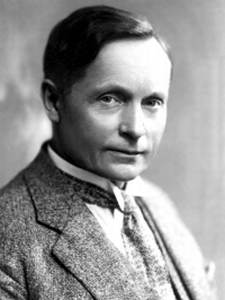
Ādolfs Ābele
(24.01.1889 - 02.08.1967 )
A. Abele belongs to the contemplative romantics in Latvian music. Moreover, in his orchestral miniatures, romanticism is tinged and freshened by impressionism. His creative writing shows him to be a master of subtle shades of reflective and lyrical mood, and his most characteristic genre is the refined and delicate symphonic miniature. His work as choral conductor, however, led him to write also choral music and folk song arrangements for choir. The meditative nature of Abele's writing is well suited to the requirements of sacred choral music.
Abele was born in Blome in the District of Valka, and gained his general education in Cesis. He moved to Riga in 1907 and studied music privately with Emils Darzins (see also). In 1909 he enrolled at the St Petersburg Conservatory. Here he studied the organ with Louis Homilius and Jacques Handschin (graduating in 1914), and theory of composition with Jazeps Vitols (graduating in 1915). For some years he served as military bandmaster and musician with the Latvian Riflemen, in 1918 worked as piano accompanist at the Latvian Opera, and in 1919 served in the Latvian Army, in the so-called Brigade of Balodis. From 1920 he worked as organist and conductor in Liepaja, and was Director of the College of Music there. In 1924 he returned to Riga and for the next 20 years taught theoretical subjects at the LC (from 1938 as professor), as well as supervising the training of military bandmasters at the LC. Under his baton (1927–1944) the mixed choir of the Latvian University Student Association Dziesmuvara became one of the leading Latvian choirs of its time, gaining international recognition during concert tours in Estonia, Lithuania, Finland, Denmark, Norway and Sweden.
In 1944 Abele fled Latvia as a war refugee and arrived in Germany, where he was once again active in organizing and conducting choirs. He was Principal Conductor at Latvian song festivals held in Germany in the post-war years (Esslingen, 1947; Fischbach, 1948). He moved to the USA in 1949 and worked as an organist there, first in Allegan, and from 1951 in Kalamazoo, where he also conducted the Latvian choir for a number of years. Abele was Principal Conductor at the Second Latvian Song Festival in the USA in 1958. His unique choral style is marked by the use of extensive, precisely executed harmonic development, ornamental chording, and unhurried rhythmic settings and structural development. These as if deliberately prolonged and sustained moods are effective as a compositional device. Abele makes even more use of this device in his solo songs and symphonic miniatures.
